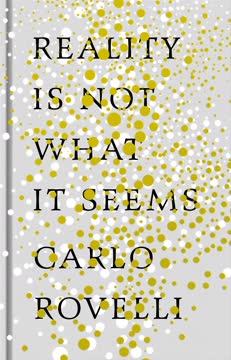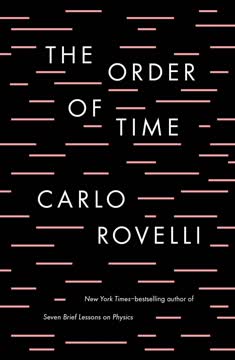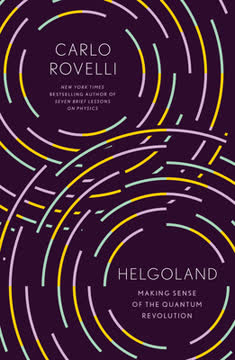Key Takeaways
1. Our understanding of reality is constantly evolving
Every time we glimpse a new aspect of it, it is a deeply emotional experience. Another veil has fallen.
Ancient insights rediscovered. The journey of physics began with ancient Greek thinkers like Anaximander and Democritus, who proposed revolutionary ideas about the nature of reality. These early insights, such as the concept of atoms and the idea that the Earth floats in space, were often forgotten or dismissed for centuries before being rediscovered and validated by modern science.
Scientific revolutions. The history of physics is marked by major paradigm shifts:
- Copernicus showed that Earth is not the center of the universe
- Newton unified celestial and terrestrial physics
- Einstein revealed the malleability of space and time
- Quantum mechanics exposed the probabilistic nature of reality at small scales
Each of these revolutions fundamentally changed our understanding of the world, often in ways that seemed counterintuitive or even absurd at first. This pattern suggests that our current understanding, while powerful, is likely incomplete and may be overturned by future discoveries.
2. Space and time are not what they seem
Reality is reduced to interaction. Reality is reduced to relation.
Einstein's insights. General relativity revealed that space and time are not fixed backdrops for events, but dynamic entities that can bend, stretch, and even merge into a single concept: spacetime. This realization overturned centuries of Newtonian physics and our intuitive understanding of reality.
Quantum spacetime. At the smallest scales, spacetime itself becomes granular and probabilistic:
- Space is composed of discrete "atoms" or quanta
- Time may not exist as a fundamental entity, but emerges from interactions
- The smooth, continuous spacetime we experience is an approximation that breaks down at the Planck scale
These ideas challenge our most basic assumptions about the nature of reality and suggest that our everyday experience of space and time is a kind of illusion arising from our macroscopic perspective.
3. Quantum mechanics reveals a probabilistic universe
The future is genuinely unpredictable.
Fundamental uncertainty. Quantum mechanics introduces indeterminacy at the heart of physics. Unlike classical physics, which in principle allows perfect prediction given complete information, quantum mechanics only provides probabilities for different outcomes.
Key aspects of quantum mechanics:
- Particles can exist in superpositions of states
- Measurement collapses the wavefunction, determining a specific outcome
- Entanglement allows for "spooky action at a distance"
- The observer effect means we cannot measure a system without disturbing it
These features have been extensively verified experimentally, despite seeming to defy common sense. They suggest that the universe is inherently probabilistic, not deterministic, and that our classical intuitions about causality and locality break down at the quantum scale.
4. The world is made of quantum fields, not particles
Fields that live on themselves, without the need of a spacetime to serve as a substratum, as a support, and which are capable by themselves of generating spacetime, are called 'covariant quantum fields'.
Fields as fundamental. Modern physics suggests that the fundamental constituents of reality are not particles, but quantum fields that permeate all of spacetime. Particles are excitations or quanta of these fields, much like waves on the surface of an ocean.
Properties of quantum fields:
- They exist everywhere in space, even in "empty" vacuum
- Different types of fields (electromagnetic, electron, quark, etc.) interact to produce the phenomena we observe
- They can create and annihilate particles
- They unify the wave-particle duality of quantum mechanics
This field-based view of reality provides a more unified and elegant description of the universe than the traditional particle-based model. It also helps explain phenomena like virtual particles and the Higgs mechanism.
5. Quantum gravity merges general relativity and quantum mechanics
The problem at the root of the idea of thermal time is simple. In Chapter 7, I showed that it is not necessary to use the notion of time to describe physics. It is better to forget time altogether.
The challenge. General relativity and quantum mechanics, the two pillars of modern physics, seem incompatible. Quantum gravity aims to reconcile them, providing a unified theory of all fundamental forces and particles.
Key ideas in quantum gravity:
- Spacetime itself is quantized, composed of discrete units at the Planck scale
- The smooth geometry of general relativity emerges from quantum interactions
- Loop quantum gravity describes space as a network of interlinking "loops"
- Time may not be a fundamental feature of reality, but an emergent phenomenon
While still a work in progress, quantum gravity promises to revolutionize our understanding of the universe, potentially resolving paradoxes like the information loss problem in black holes and the nature of the Big Bang.
6. The Big Bang may have been a Big Bounce
Our universe could thus be the result of the collapse of a previous contracting universe passing across a quantum phase, where space and time are dissolved into probabilities.
Beyond the singularity. Classical general relativity predicts that the universe began in a singularity of infinite density and temperature. However, quantum gravity suggests a different picture:
- The universe may have "bounced" from a previous contracting phase
- Quantum effects prevent infinite compression, avoiding the singularity
- Space and time dissolve into a quantum foam at the Planck scale
- Our universe may be one of many in a cyclical or branching multiverse
This "Big Bounce" scenario resolves the problem of the initial singularity and opens up the possibility of a pre-Big Bang history. It also suggests that the fundamental laws of physics may extend beyond our observable universe.
7. Information plays a fundamental role in physics
Information is the measure of the number of possible alternatives for something.
Information as physical. The concept of information, formalized by Claude Shannon, has become increasingly central to physics:
- Thermodynamics and entropy can be understood in terms of missing information
- Quantum mechanics limits the amount of information a system can contain
- Black hole thermodynamics relates entropy to the surface area of the event horizon
- The holographic principle suggests that the information content of a region is proportional to its surface area, not its volume
These insights suggest that information may be a fundamental aspect of reality, perhaps even more basic than matter or energy. This perspective has led to new approaches in understanding quantum mechanics, black holes, and the nature of spacetime itself.
8. Time may emerge from our ignorance of microscopic details
Time is our ignorance.
Thermal time hypothesis. The apparent flow of time may not be a fundamental feature of reality, but an emergent phenomenon arising from our incomplete knowledge of microscopic states:
- At the most fundamental level, physics may be timeless
- Our perception of time arises from statistical averages over many quantum events
- The arrow of time is linked to the increase of entropy (disorder) in closed systems
- Time and temperature may be deeply connected, both arising from our limited access to microscopic information
This radical idea suggests that time, like temperature, is a macroscopic concept that loses meaning at the most fundamental scales. It offers a potential resolution to the problem of time in quantum gravity and challenges our deepest intuitions about the nature of reality.
9. Science progresses through awareness of our ignorance
Awareness of the limits of our knowledge is also awareness of the fact that what we know may turn out to be wrong, or inexact.
Embracing uncertainty. The scientific method is fundamentally based on skepticism and the willingness to revise or discard even our most cherished theories in light of new evidence.
Key aspects of scientific progress:
- Theories are always provisional, subject to revision or replacement
- The most reliable theories are those most open to falsification
- Great discoveries often come from questioning established wisdom
- Science advances by recognizing the limits of current knowledge
This approach has led to remarkable progress in our understanding of the universe, but also requires humility and the acceptance that our current theories, no matter how successful, may one day be superseded by more accurate or comprehensive models.
Last updated:
FAQ
What's "Reality is Not What it Seems" about?
- Exploration of Quantum Gravity: The book delves into the journey of understanding quantum gravity, a field that seeks to unify general relativity and quantum mechanics.
- Historical Context: It traces the evolution of scientific thought from ancient philosophers like Democritus to modern physicists, highlighting how our understanding of reality has changed.
- Conceptual Revolution: Rovelli discusses how concepts of space and time have been radically altered by twentieth-century physics, particularly through the theories of relativity and quantum mechanics.
- Vision of the Universe: The book presents a vision of the universe as a dynamic, interconnected web of quantum events, challenging traditional notions of space and time.
Why should I read "Reality is Not What it Seems"?
- Deepen Understanding of Physics: It provides a comprehensive overview of the fundamental concepts in modern physics, making complex ideas accessible to a general audience.
- Philosophical Insights: The book offers philosophical reflections on the nature of reality, encouraging readers to question their perceptions and assumptions.
- Engaging Narrative: Rovelli combines scientific rigor with engaging storytelling, making the exploration of abstract concepts both informative and enjoyable.
- Broaden Perspective: Reading this book can broaden your perspective on the universe and our place within it, fostering a sense of wonder and curiosity.
What are the key takeaways of "Reality is Not What it Seems"?
- Quantum Nature of Space: Space is not a continuous entity but is composed of discrete quanta, challenging the traditional view of space as a smooth continuum.
- Relational Time: Time is not a universal constant but emerges from the interactions of quantum events, suggesting that time is more relational than absolute.
- Unified Theory of Fields: The book posits that all physical phenomena can be understood as manifestations of quantum fields, including gravity.
- End of Infinity: Quantum gravity suggests that infinities, such as those predicted by classical physics, do not exist in reality, offering a more finite and comprehensible universe.
How does Carlo Rovelli explain quantum gravity in "Reality is Not What it Seems"?
- Granular Space: Rovelli explains that space is made up of tiny, discrete units called "quanta," which form the fabric of the universe.
- Spin Networks: He introduces the concept of spin networks, which are graphs that represent the quantum states of space, showing how space is woven from these fundamental elements.
- Spinfoams: The book describes spinfoams as the histories of spin networks, illustrating how space and time emerge from these quantum processes.
- Beyond Classical Physics: Rovelli emphasizes that understanding quantum gravity requires moving beyond classical physics and embracing a new framework where space and time are not fundamental.
What are the most important concepts in "Reality is Not What it Seems"?
- Quantum Granularity: The idea that space and time are composed of discrete units, rather than being continuous.
- Relational Reality: The concept that reality is defined by interactions and relationships between quantum events, rather than independent objects.
- Covariant Quantum Fields: The notion that all physical phenomena, including space and time, are manifestations of quantum fields.
- Big Bounce Theory: A hypothesis suggesting that the universe may have undergone a bounce, rather than a singular Big Bang, due to quantum gravitational effects.
How does "Reality is Not What it Seems" challenge traditional views of space and time?
- Non-Continuous Space: Rovelli argues that space is not a smooth continuum but is made up of discrete quanta, challenging the classical view of space.
- Emergent Time: The book suggests that time is not a fundamental aspect of the universe but emerges from the interactions of quantum events.
- Dynamic Spacetime: Space and time are not static backdrops but dynamic entities that are influenced by the presence of matter and energy.
- Relational Framework: The traditional notion of absolute space and time is replaced by a relational framework where events are defined by their interactions.
What is the significance of the "Big Bounce" theory in "Reality is Not What it Seems"?
- Alternative to Big Bang: The Big Bounce theory offers an alternative to the traditional Big Bang model, suggesting that the universe may have rebounded from a previous contraction.
- Quantum Repulsion: Rovelli explains that quantum gravitational effects could prevent the universe from collapsing into a singularity, leading to a bounce.
- Implications for Cosmology: This theory has significant implications for our understanding of the universe's history and its potential future.
- Testable Predictions: The Big Bounce theory provides testable predictions that could be confirmed through observations of cosmic background radiation.
How does Carlo Rovelli address the concept of infinity in "Reality is Not What it Seems"?
- End of Infinity: Rovelli argues that quantum gravity eliminates the concept of infinity, as there is a minimum scale to space and time.
- Singularities Resolved: The theory suggests that singularities, such as those predicted by classical physics, do not exist due to quantum effects.
- Finite Universe: The book posits that the universe is vast but finite, challenging the notion of an infinitely large cosmos.
- Practical Implications: By placing limits on infinity, quantum gravity resolves many of the mathematical inconsistencies found in classical theories.
What role does information play in "Reality is Not What it Seems"?
- Information as Fundamental: Rovelli suggests that information is a fundamental aspect of reality, influencing how physical systems interact.
- Correlations and Relations: Information is seen as the measure of correlations between different systems, shaping the structure of the universe.
- Thermodynamics and Quantum Mechanics: The concept of information is linked to both thermodynamics and quantum mechanics, providing a unifying framework.
- Emergence of Time: Information theory helps explain the emergence of time as a macroscopic phenomenon resulting from the averaging of microscopic variables.
What are the best quotes from "Reality is Not What it Seems" and what do they mean?
- "Reality is a network of granular events": This quote encapsulates the idea that the universe is composed of discrete quantum events, rather than continuous processes.
- "Time is our ignorance": Rovelli suggests that our perception of time is a result of our limited understanding of the universe's fundamental processes.
- "The world is a game of mirrors": This metaphor highlights the relational nature of reality, where objects and events are defined by their interactions and reflections.
- "The truth is in the depths": A nod to Democritus, this quote emphasizes the importance of delving deep into the nature of reality to uncover fundamental truths.
How does "Reality is Not What it Seems" relate to the history of scientific thought?
- From Democritus to Einstein: Rovelli traces the evolution of scientific ideas from ancient atomism to modern quantum gravity, showing how our understanding has progressed.
- Revolutionary Ideas: The book highlights key moments in history where revolutionary ideas challenged and changed our perception of reality.
- Interdisciplinary Approach: Rovelli draws on philosophy, mathematics, and physics to provide a comprehensive view of the development of scientific thought.
- Continuity and Change: The narrative emphasizes both the continuity of certain ideas, like granularity, and the radical changes brought about by new discoveries.
What future directions does "Reality is Not What it Seems" suggest for physics?
- Further Exploration of Quantum Gravity: Rovelli encourages continued research into quantum gravity to refine and test the theories presented.
- Integration of Information Theory: The book suggests that integrating information theory with quantum mechanics and general relativity could lead to new insights.
- Experimental Confirmation: Rovelli emphasizes the importance of empirical tests, such as those involving cosmic background radiation, to validate theoretical predictions.
- Open Questions: The book leaves open several questions about the nature of reality, inviting future physicists to explore and expand upon these ideas.
Review Summary
Reality is Not What it Seems offers an accessible introduction to quantum gravity and loop quantum theory. Rovelli explains complex physics concepts through historical context and poetic language. Many readers appreciate his clear writing style and ability to make difficult ideas comprehensible. The book covers the development of physics from ancient Greece to modern quantum mechanics. Some criticize Rovelli's treatment of competing theories and philosophical implications. Overall, readers find the book engaging and thought-provoking, praising Rovelli's passion for science and his skill in conveying complex ideas to a general audience.
Similar Books
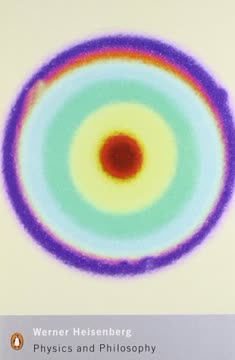



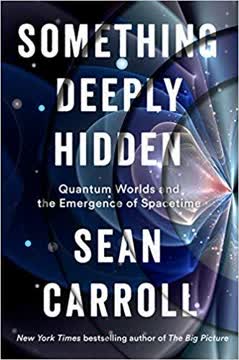


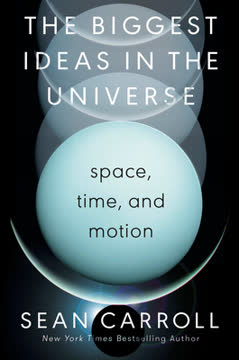
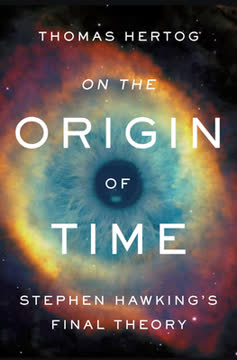

Download PDF
Download EPUB
.epub digital book format is ideal for reading ebooks on phones, tablets, and e-readers.
